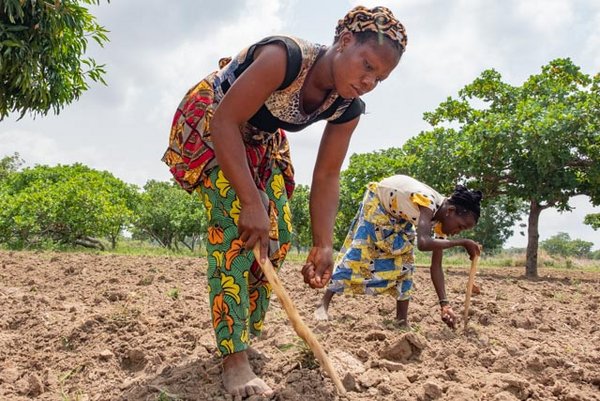- Share this article
- Subscribe to our newsletter
Approaches in smallholder farmer promotion
On 4 March 2020, the German Development Institute (DIE), in collaboration with “Netzwerk entwicklungspolitischer Fachleute” (a network of independent development professionals) carried out a non-public workshop which aimed at fostering exchange and dialogue among development agencies to eventually overcome stereotyped antagonisms in smallholder farmer promotion.
Altogether, 25 participants took part, representing 12 organisations (GOs, NGOs and private sector) active in this field, particularly members of the support group of the German Special Initiative “A World Without Hunger” (SEWOH), plus some free-lance experts.
After an introduction by Michael Brüntrup (DIE), Prof. Theo Rauch’s keynote highlighted existing controversies but also areas of common ground, addressing four different dimensions:
- Integrated vs. product-oriented approaches
- Ecological/low-input vs. conventional/high-input farming technologies
- Public vs. private service systems
- Regional vs. global food systems
In the further course of the workshop, nine organisations presented their specific experiences, highlighting a wide range of approaches and successes, but also their limitations. The first three dimensions outlined in the keynote were then taken up in working groups, where the advantages and disadvantages of the individual approaches were discussed, as well as possible combinations and open questions.
Integrated/livelihood -oriented vs. product-oriented (value chain) approaches
The participants of the working group on integrated/livelihood-oriented vs. product-oriented (value chain) approaches came to the conclusion that value chain promotion may achieve considerable income benefits for farmers and helps to improve quality and quantity of supply. However, vulnerable groups tend to be left out, and market dependency and sustained unequal power relations may involve additional risks for poor farmers.
On the other hand, integrated and territorial approaches address all aspects of rural livelihoods and enhance people’s ownership and participation; but they are quite complex, both conceptionally and with regard to requirements for partner organisations and local realities, and thus risk being implemented partially, at small scale and with low economic improvements only. As a conclusion, participants advocated for a combination of both approaches, focussing on “people as well as products”.
Ecological/low-input vs. conventional/high-input farming technologies
The advocates of ecological /sustainable farming techniques underlined the advantage of lasting productivity gains and the protection of natural resources, combined with enhanced resilience for farm households; but they also acknowledged challenges such as limited labour capacity and the need for competent extension services.
Other participants argued that intensified agricultural production and climate change call for more external inputs like fertiliser and new seed varieties, and that modern mechanisation, storage and processing facilities are needed for mass production to supply urban or foreign markets and to reduce food losses. On the other hand, issues like fake products, indebtedness, health and environmental risks, etc., challenge the use of modern inputs, and poor farmers might not be able or shy away from spending on them.
While the participants could not reach a consensus, they nevertheless acknowledged that short-term production and productivity gains cannot be the only objectives in rural development. They also identified some common concerns like seed quality insurance systems and more agricultural research especially for the eco-sector.
Public vs. private service systems
Private systems were considered in general to be more demand-driven, flexible and dynamic, and often more competent in special areas, according to the participants. However, depending on the sponsor, they might be biased towards certain products and not necessarily interested in sustainability.
Public systems, on the other hand, seem to be in general more “neutral” and potentially powerful instruments to promote public strategies in rural /agricultural development. However, in reality, they are often underfinanced, depend on short-lived programmes, and show little flexibility, demand orientation and presence in the field.
Participants agreed that there should be ways and means to combine the advantages of both systems, e.g. through voucher systems or extension services oriented to producers’ associations. Farmers should be trained on how to assess the quality of extension, and more efforts should be made to improve vocational training and use alternative channels like mass media, cell phones, etc.
Adelheid Kückelhaus, Michael Brüntrup, Netzwerk entwicklungspolitischer Fachleute und DIE, Bonn, Germany





Add a comment
Be the First to Comment